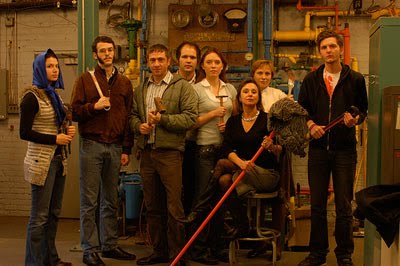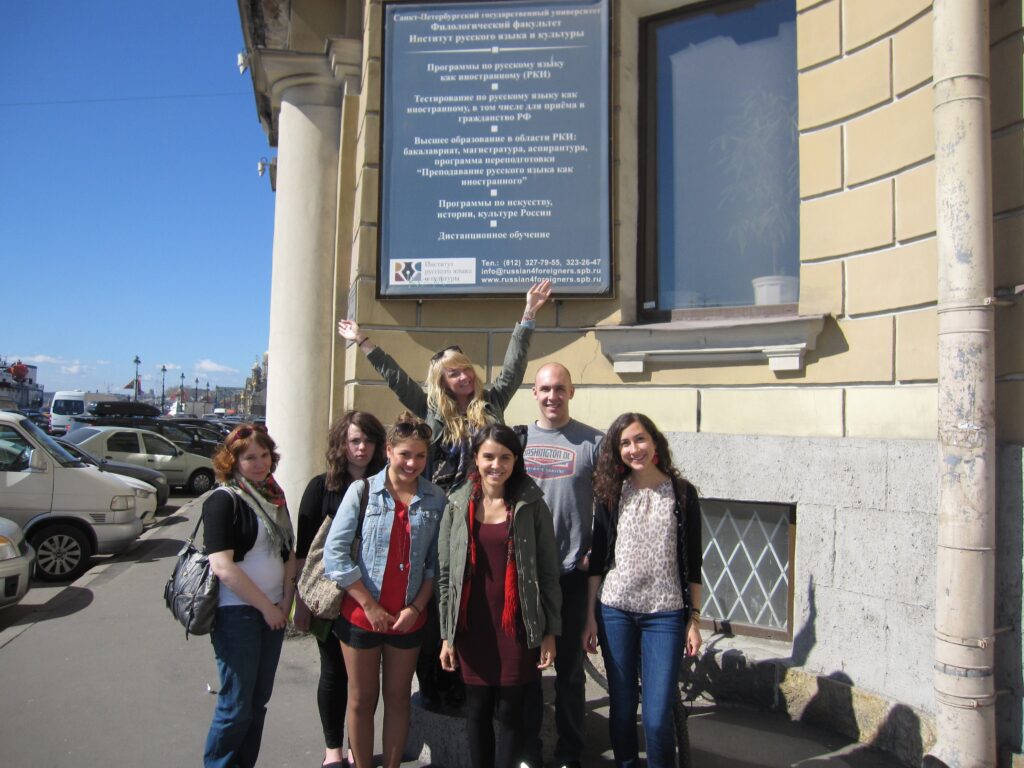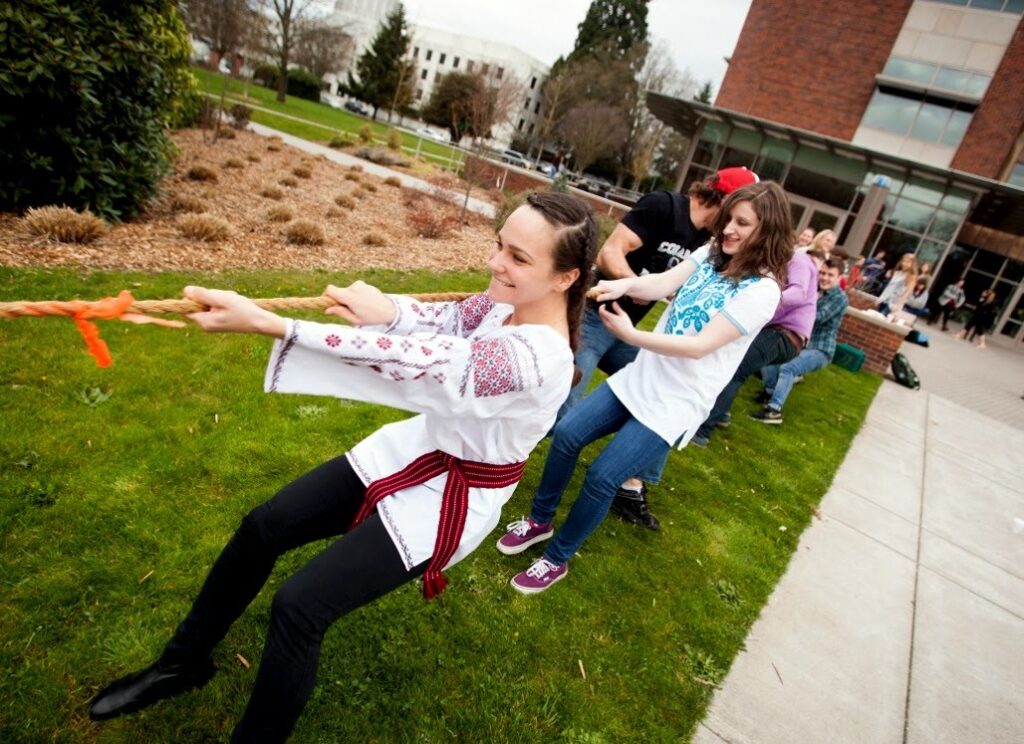Education
Lewis & Clark College

at International Fair, 2012
Lewis & Clark College is a private liberal arts institution with approximately 2,000 undergraduates. Although some basic courses in Russian were offered as early as in the 1940s, Russian language became a permanent offering in the 1970s. In 1979 Lewis & Clark sent its first overseas program to the Soviet Union. In 1990 the college added a tenure-track position in Russian, and in 1992 it established a Russian minor. Later it also established a Foreign Languages major that requires the study of two languages and at least one full semester of study in the country of the primary language. Currently, Lewis & Clark students of Russian can participate in two overseas programs in Russia, one in St. Petersburg (CIEE) and the other in Vladivostok (SRAS). Graduates in the Russian Program have received prestigious national awards, such as Fulbright (nine awards between 2006-2012), the Davis Peace Fellowship, the Boren Critical Languages scholarship and many other grants. Lewis & Clark students of Russian volunteer for Slavic social organizations in Portland, such as ROSS and IRCO, and they make Russian-themed contributions to annual Lewis & Clark events, such as the International Affairs Symposium and the International Fair, both of which take place in the spring semester. More information…
The University of Oregon

Liudmila, directed by Julia Nemirovskaya
Russian, East European, and Eurasian Studies at the University of Oregon is one of the oldest programs devoted to the study of Russia, Eastern Europe, and Eurasia in the United States. Established in 1968, it was a founding institutional member of the American Association for the Advancement of Slavic Studies, now the Association of Slavic, East European, and Eurasian Studies. In its first three decades, REEES brought together scholars with a shared interest in the region for occasional lectures, collaborative projects, and cultural events, and it allowed students in other departments to earn a certificate of mastery in the Russian and East European area.
The program today reflects this long history of interdisciplinary scholarly interaction, but the 1998 merger of the Russian and East European Studies Center with the Russian Department has transformed a loose collegial grouping into a comprehensive degree-granting program at the bachelor’s and master’s levels. REEES now offers an interdisciplinary undergraduate major and minor and a master’s degree with concentrations in Russian literature, Russian language, Russian and East European history, Slavic linguistics, and contemporary Russia, Eastern Europe, and Eurasia. Russian language courses are available for non-Russian speakers and Russian heritage learners alike, and students routinely spend either a term or a year of study abroad in Russia, Eastern Europe, or Eurasia. REEES sponsors an annual Russian play and occasional lectures, symposia, conferences, and cultural events, all of which are free and open to the public. More information…
Reed College

(photo by Adams Carroll, Reed ’09)
Russian was first introduced into the Reed curriculum in 1939 with a single class on grammar. Intermediate Russian was added the following year, though its teaching was dropped in 1942 and 1943. From 1944 on, classes were slowly added until an average of ten a year was hit in the early 60s, a level maintained until the present. Literature courses were added in the late 50s. Currently Reed boasts one of the most rigorous undergraduate programs in Russian literary and cultural studies in the country. The department offers three levels of Russian and courses in all periods of Russian literature – from old to contemporary –, literary theory, cinema, artistic movements, various genres, and individual authors. The department regularly organizes talks by prominent Slavists and Jewish studies scholars from the US and abroad as well as symposia, such as most recently “Eugene Onegin: Pushkin’s Novel in Verse, Tchaikovsky’s Opera, a Russian Theme,” and “Russia – Italy: Cases of Cultural Appropriation.” Most of the students majoring in Russian spend a year or a semester studying in Russia. The unique feature of Reed’s Russian program is the specialization in East European Jewish literature and culture, including courses in Hebrew and Yiddish literature in translation. The program’s graduates have gone on to successful careers in academia, journalism, and finance, among many others. More information…
Russian Flagship Center, Portland State University

Portland State University, the largest and most diverse public university in Oregon, offers both a minor and a major in Russian and, for students of the PSU Russian Flagship Program, a Certificate of Advanced Proficiency in Russian. With its focus on undergraduate education, the Russian Program embraces the school motto “Let Learning Serve the City.” All PSU students of Russian have opportunities to use their Russian either through the Russian Club, which provides tutoring for Russian immersion programs in the Portland Public School system, or through internships and Senior Capstone projects both in Portland and in Russia. Launched in 2010, the Student to Student Writing Initiative supports the publication of books written and illustrated by PSU students of Russian for use in Russian immersion grade school programs. The Russian Flagship Center, funded by the National Security Education Program in 2008, permits students majoring in any discipline to acquire professional level proficiency in Russian by completing a rigorous series of Russian across the curriculum courses at PSU prior to study at St. Petersburg State University, where, in addition to studying Russian, they take university classes and compete an internship related to their professional interests. Graduating with ACTFL Superior proficiency in Russian, these accomplished students look forward to fulfilling careers in the public and private sectors. More information…
Willamette University

Willamette University is a private liberal arts institution with approximately 2,000 undergraduate students in its College of Liberal Arts and 700 graduate students in its professional schools. It has been offering Russian since at least the 1950s. In 1988 Willamette established an exchange program with then Simferopol State University (now Tavrida National University), and this program in the Crimea has become one of the University’s most longstanding exchanges. In 2000 the University created a tenure-track position in Russian, and in 2009 it hired a second tenure-track colleague in Russian, and together these colleagues teach courses in Russian language, literature, cinema, and culture. Students can declare a Russian minor, they can petition for a Russian major, and they also can declare an International Studies major with a focus on Russia. Our students have participated in service programs in the greater Salem area, most recently in Salem-Keizer schools, and the University’s student Russian Club plays an important role in campus events, most noticeably in our annual Maslenitsa celebration. The program’s recent graduates have earned such prestigious awards as the Benjamin A. Gilman International Scholarship, the National Security Education Program David L. Boren Scholarship, the Carnegie Endowment for International Peace Junior Fellowship, and Fulbright U.S. Student Program fellowships. More information…
Portland Community College

Since 1990, Portland Community College has offered a full two-year Russian program with all courses transferable to four-year institutions. We have the largest enrollments in both first year and second year in the state. All Russian language courses are taught in full immersion helping students to build strong speaking skills in the Russian. Students also enjoy elective courses in Russian culture, film and literature, which are conducted in English to allow student to discuss cultural issues in depth.
Since 2011, eleven PCC Russian students have won the prestigious state-department CLS scholarship, allowing them to study intensive Russian in Vladimir, Russia for free. Our students also volunteer for Slavic social service organizations in Portland such as ROSS and IRCO. PCC Russian students regularly transfer to four-year universities where they major and minor in Russian. Recent students have continued their Russian studies at Portland State University, University of Oregon, Reed College, Lewis& Clark College, University of Washington, George Washington University, Georgetown University, Pomona College, American University and many other institutions. Some of our strongest students enroll in the Portland State University Russian Flagship program in order to attain professional level proficiency. For more information…
Public Primary and Secondary Schools
Heritage Elementary School
440 Parr Road
Woodburn, Oregon 97071
503-981-2600
Principal: Irene Novichihin
Woodburn School District is a multicultural educational school system with a diverse population. Over fifty-percent of Woodburn residents are of Hispanic or Russian descent, and the Woodburn School District’s 5,000+ student body reflects that diversity. Signs of three cultures abound in food, language, religion, music and dress. A primary thread of the school district’s Mission and Strategic Plan is preparing students for a multi-lingual, multi-cultural world.
http://woodburn.hes.schoolfusion.us/?sessionid=d8424c1bcde751229234d0953db3ce1a&t
Kelly Elementary School (Russian immersion program in SE Portland)
9030 SE Cooper | Portland, OR 97266
Phone: (503) 916-6350 | Fax: (503) 916-2644
